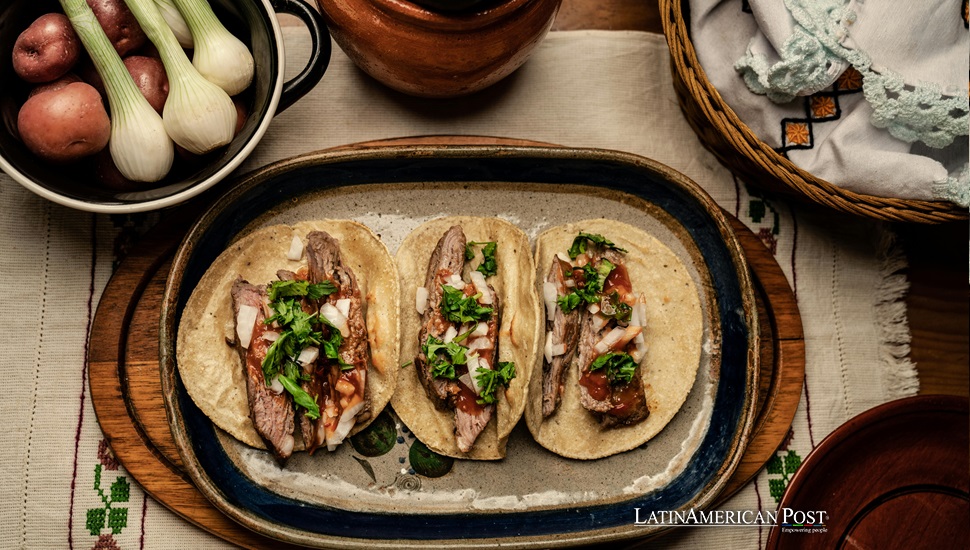Discover the Flavors of Ibero-American Cities Through Gastronomy

Gastronomy in Ibero-American cities has become a significant tourist attraction, blending tradition, innovation, and the fusion of flavors between Latin America and Europe. The Union of Ibero-American Capital Cities (UCCI) aims to promote this culinary journey as a tool for sustainable tourism.
A Cultural Bridge Across Continents
Ibero-American cuisine represents an extraordinary exchange of cultures, ingredients, and traditions that have shaped the culinary identities of cities across Latin America, the Caribbean, and the Iberian Peninsula. The recently launched study, A Journey of Flavors: Principles for Sustainable Development of Gastronomic Tourism in Ibero-American Cities, by the UCCI, shines a spotlight on these regions’ unique qualities and rich gastronomic traditions, highlighting their immense potential as tourism drivers.
The report at Madrid’s Casa de América offers a comprehensive look at the growing trend of gastronomic tourism and its ability to foster cultural exchanges. It also emphasizes that food is more than just sustenance; it is a social experience that bridges generations, encourages inclusion, and deepens cultural understanding.
The collaboration with Verne Tourist Experts, under the leadership of consultant Iñaki Gaztelumendi, as part of the Ibero-American Strategy for Tourism of the Future, outlines how cities can leverage their culinary heritage to build sustainable, innovative, accessible, and safe tourism models. For UCCI cities, food is not just an economic asset but a vital part of their identity, capable of enhancing their international appeal.
Gastronomy as a Key Tourist Attraction
Food has always been an essential part of the experience for travelers, but in recent years, the desire to explore unique culinary landscapes has grown into a powerful motivation for choosing specific destinations. According to Almudena Maíllo, secretary-general of the UCCI, gastronomy plays a pivotal role in shaping a city’s identity, culture, and economy.
“Talking about gastronomy in cities is about identity, culture, economy, and social movements,” Maíllo stated. She refutes the notion that tourists undervalue food, insisting that it has become a significant factor in their decision-making process. When tourists select a city, one of their key activities is enjoying local cuisine and seeking out authentic and innovative food experiences.
For example, culinary tourism has grown tremendously in cities like Madrid, with gastronomy now being the second most essential reason tourists visit the Spanish capital. This trend is partly driven by the diverse array of Latin American restaurants that have emerged due to the city’s vibrant immigrant community. The result is an exciting fusion of flavors that invites visitors to explore the world through their palate.
Gastronomic Tourism: Tradition Meets Innovation
The UCCI’s study underscores that gastronomic tourism in Ibero-American cities is deeply rooted in tradition while embracing innovation. This blend of old and new is critical to understanding the region’s appeal as a culinary destination. In Latin America, food history is rich with indigenous roots, colonial influences, and recent global exchanges, creating dishes that tell a story of resilience, creativity, and cultural blending.
From the vibrant street food markets of Mexico City to the seafood dishes of coastal Lima, Ibero-American cuisine offers travelers the chance to experience the authentic flavors of a region shaped by its land, history, and people. The report encourages cities to embrace these culinary treasures to attract tourists and preserve their cultural heritage.
What sets Ibero-American gastronomy apart is its deep connection to the land and its people. The fusion of Latin American and European flavors reflects centuries of exchange, where ingredients from both continents merge to create something unique. This relationship between food, culture, and environment makes gastronomic tourism a compelling and sustainable option for cities looking to enhance their tourism offerings.
Sustainability and Food Tourism
As the demand for culinary experiences grows, cities have a significant opportunity to promote sustainable tourism through food. The UCCI report highlights how gastronomic tourism can catalyze sustainable development by encouraging the use of local products, reducing food waste, and fostering responsible consumption. This is particularly important in the context of global food systems, where sustainability is becoming an increasingly critical issue.
Sustainable food tourism boosts local economies by supporting small-scale farmers and food producers and promotes environmental stewardship. Ibero-American cities can offer tourists an authentic culinary experience while promoting sustainability by showcasing traditional cooking methods, local ingredients, and farm-to-table practices.
Incorporating sustainability into food tourism also means thinking beyond restaurants and markets. Cities are encouraged to create broader culinary experiences that include visits to farms, wineries, and artisanal food producers, providing travelers with a deeper understanding of the food they consume and its environmental impact.
By focusing on sustainable gastronomic tourism, cities can offer travelers a unique way to explore their destinations while contributing to a more resilient and eco-friendly tourism model.
The Future of Gastronomic Tourism in Ibero-America
The UCCI’s focus on gastronomic tourism as a tool for sustainable development marks a forward-thinking approach to tourism in Ibero-American cities. The principles outlined in the A Journey of Flavors report serve as a guide for cities looking to harness the potential of their culinary heritage in an innovative and sustainable way.
The future of gastronomic tourism lies in cities embracing their culinary identity, preserving their traditions, and sharing them with the world. As cities continue to develop their tourism offerings, food will remain a key component of what draws visitors to their streets, markets, and restaurants.
Through promoting local ingredients, traditional recipes, and sustainable practices, Ibero-American cities can position themselves as global leaders in food tourism. The fusion of flavors, history, and innovation that defines Ibero-American gastronomy is a testament to the region’s rich cultural heritage and ability to adapt and evolve.
As gastronomic tourism continues to grow, cities that invest in their culinary identity will attract more visitors and contribute to preserving their cultural and environmental resources. For tourists, this means the chance to embark on a journey of flavors that offers more than just a meal — it provides a connection to the people, history, and culture of Ibero-America.
A Culinary Experience Like No Other
The rise of gastronomic tourism in Ibero-American cities reflects a broader trend in which travelers seek more profound, more meaningful connections with the places they visit. Food, as both sustenance and culture, offers an ideal gateway to explore a city’s soul.
Whether savoring traditional dishes in bustling markets or indulging in innovative culinary creations, gastronomic tourism offers travelers a sensory journey through Ibero-America’s rich cultural landscape. The UCCI’s initiative to promote this type of tourism highlights the potential for cities to share their unique culinary heritage while promoting sustainable and responsible tourism practices.
Also read: Peruvian Chefs Transforming Global Cuisine
For cities across Latin America, the Caribbean, and the Iberian Peninsula, the future of tourism lies not just in their historical landmarks or natural beauty but in the kitchens, markets, and dining tables where the flavors of Ibero-America come alive.



